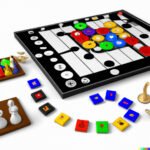Tabletop game classic board games have been a staple in households for generations, providing hours of entertainment and bonding among family and friends. From the ancient origins of games like Senet and Mancala to the iconic titles like Monopoly and Scrabble, these tabletop game classics have stood the test of time, captivating players of all ages.
The history of tabletop game classic board games is rich and diverse, with roots that can be traced back thousands of years. As societies evolved, so did the games they played, leading to an incredible variety of board games that have become beloved worldwide. Understanding the origins and development of these games provides insight into their lasting appeal and cultural significance.
As we delve into the history of these classic board games, we’ll explore their evolution over time, from simple dice and strategy games to intricate designs and immersive gameplay. We’ll also examine the impact these games have had on society, from promoting critical thinking skills to fostering social interaction and healthy competition among players. Join us as we embark on a journey through time to uncover the fascinating story behind tabletop game classic board games.
The Most Popular Tabletop Game Classic Board Games of All Time
Classic board games have been a staple in households for decades, providing endless entertainment and bringing families and friends together. Some of the most popular tabletop game classic board games of all time include Monopoly, Scrabble, and Clue.
Monopoly, a game of strategy and negotiation, was first published in 1935 and has since become one of the best-selling board games in the world. It has been adapted into numerous themed versions based on different cities, movies, and TV shows.
Scrabble, a word game where players earn points by forming words from individual lettered tiles on a game board, was first created in 1938 by Alfred Mosher Butts. It has gained a reputation for boosting vocabulary and language skills while providing an enjoyable challenge for players of all ages.
Clue, also known as Cluedo outside of North America, is a murder mystery game where players use deductive reasoning to determine the culprit, the murder weapon, and the location of the crime. First released in 1949, this classic game continues to entertain generations with its intriguing gameplay.
These three classic board games are just a few examples of the timeless entertainment that tabletop gaming provides. They have stood the test of time and continue to be enjoyed by people around the world.
| Game | Year Released |
|---|---|
| Monopoly | 1935 |
| Scrabble | 1938 |
| Clue/Cluedo | 1949 |
How Tabletop Game Classic Board Games Have Evolved Over the Years
Tabletop Game Classic Board Games have a rich and diverse history, evolving over the years to become the beloved games we know today. From ancient civilizations to modern times, these games have undergone many changes and adaptations.
Origins of Tabletop Game Classic Board Games
The origins of many classic board games can be traced back thousands of years to various civilizations around the world. Games like Chess, Backgammon, and Go have roots in ancient India, Mesopotamia, and China, respectively. These early versions of board games were often played on simple boards with pieces made from basic materials like stone, wood, or clay.
Evolution of Game Mechanics
Over time, tabletop game classic board games have evolved in terms of their mechanics and gameplay. Modern iterations of these classics often include new rules, variations, and strategies to keep the games fresh and engaging for players. For example, Monopoly has seen countless special editions with unique twists on the original gameplay.
Technological Advancements
With advancements in technology, tabletop game classic board games have also evolved into digital formats. Many classic board games are now available as mobile apps or online versions that allow players to compete with friends or strangers from around the world. This has brought a new level of accessibility and convenience to these timeless games while introducing them to a new generation of players.
The Benefits of Playing Tabletop Game Classic Board Games
Playing tabletop game classic board games offers numerous benefits that go beyond just entertainment. Here are some of the advantages of incorporating these timeless games into your leisure activities:
- Enhances cognitive skills: Classic board games usually require strategic thinking, decision-making, and problem-solving, which can help sharpen your cognitive abilities.
- Promotes social interaction: These games provide an opportunity for face-to-face interaction, fostering communication, cooperation, and teamwork among players.
- Reduces stress and anxiety: Engaging in a board game can be a great way to unwind and take a break from the daily pressures of life, ultimately reducing stress and anxiety levels.
In addition to these benefits, playing tabletop game classic board games can also have a positive impact on family dynamics and relationships. Whether it’s a family game night or a gathering with friends, these games facilitate bonding and create lasting memories. They can also serve as educational tools for children by teaching them important skills such as critical thinking, sportsmanship, and patience.
Ultimately, the benefits of playing tabletop game classic board games extend to various aspects of life, making them an enjoyable and worthwhile pastime for people of all ages.
Tips for Choosing the Right Tabletop Game Classic Board Games for Your Game Night
Consider the Age Group
When choosing classic board games for your game night, it’s important to consider the age group of the players. Some games may be too complex for younger children, while others may not be challenging enough for adults. Be sure to select games that are suitable for all participants in order to ensure an enjoyable and fair gaming experience.
Know Your Group’s Preferences
Take into account the preferences and interests of your game night group when selecting tabletop game classic board games. Some people may enjoy strategy-based games, while others prefer luck-based or party games. By understanding what your group enjoys, you can choose games that will cater to everyone’s tastes and keep them engaged throughout the evening.
Diversity in Game Selection
To keep game nights exciting and fresh, it’s a good idea to have a diverse selection of classic board games on hand. This could include a mix of cooperative games, competitive games, and different genres such as word-based or puzzle-based games. By providing variety in your game choices, you can cater to different moods and preferences within your group.
By considering these tips when choosing tabletop game classic board games for your game night, you can ensure that everyone has a great time and that the gaming experience is inclusive and enjoyable for all participants.
The Impact of Tabletop Game Classic Board Games on Family Bonding and Social Interaction
Tabletop Game Classic Board Games have long been recognized for their impact on family bonding and social interaction. These games encourage players to engage in face-to-face interactions, fostering meaningful connections and quality time spent together. Whether it’s playing a game of Monopoly, Scrabble, or Chess, these classic board games provide an opportunity for families and friends to come together and enjoy each other’s company.
Research has shown that playing tabletop classic board games can have a positive impact on family dynamics and relationships. According to a study published in the Journal of Marriage and Family, families who regularly engage in game nights have stronger communication skills, improved problem-solving abilities, and an overall sense of closeness. These games create a fun and relaxed environment where everyone can participate and bond over friendly competition.
In addition to strengthening family bonds, tabletop classic board games also play a significant role in enhancing social interaction. When individuals gather to play these games, they are able to connect with each other on a personal level, share laughter, and create lasting memories. Whether it’s hosting a game night with neighbors or participating in community game events, these classic board games serve as catalysts for building new friendships and fostering a sense of community.
| Family Bonding | Social Interaction |
|---|---|
| Encourages quality time together | Fosters connection on a personal level |
| Strengthens communication skills | Creates opportunities for building new friendships |
| Promotes problem-solving abilities | Fosters a sense of community |
The Rise of Digital Versions of Tabletop Game Classic Board Games
Tabletop game classic board games have been a staple of family game nights and social gatherings for decades, but with the rise of technology, digital versions of these beloved games have become increasingly popular. From online platforms to mobile apps, the digital revolution has brought classic board games to a whole new level.
Some of the most popular tabletop game classic board games have made successful transitions into the digital realm, offering players a convenient way to enjoy their favorite games anytime, anywhere. Digital versions not only provide a more accessible and portable option for gaming, but also offer additional features such as solo play against computer opponents or online multiplayer mode with friends and family from different locations.
The transition to digital versions has also brought about innovations in gameplay, with some digital adaptations adding new elements and variations to classic board games. Players can experience enhanced graphics, special effects, and even interactive tutorials that make learning the rules and strategies easier than ever before.
- With the convenience of playing anytime, anywhere
- Additional features like solo play against computer opponents or online multiplayer mode
- Innovations in gameplay with enhancements in graphics and interactive tutorials
The Future of Tabletop Game Classic Board Games in the Gaming Industry
In conclusion, tabletop game classic board games have certainly stood the test of time and continue to have a bright future in the gaming industry. As we look ahead, it’s clear that these traditional games will continue to evolve and adapt to the changing times. With advancements in technology, we can expect to see more digital versions of classic board games, making them even more accessible to a wider audience.
Furthermore, the resurgence of interest in tabletop game classic board games has also paved the way for new and innovative game designs. Game creators are constantly coming up with fresh ideas and unique twists on old favorites, keeping the enthusiasm for these timeless games alive. This creativity and willingness to experiment will ensure that classic board games remain relevant and exciting for generations to come.
Moreover, as people seek out opportunities for face-to-face interaction and quality time with loved ones, tabletop game classic board games will continue to play a crucial role in fostering social connections. Whether it’s family game nights or friendly gatherings with friends, these games provide an avenue for bonding and creating lasting memories.
The enduring appeal of these games is a testament to their ability to bring people together in a world that is increasingly dominated by digital interaction. Overall, the future looks bright for tabletop game classic board games as they continue to hold a special place in the hearts of gamers and families alike.

I love playing all kinds of games – from classics like Monopoly to modern favourites like Ticket to Ride.
I created this blog as a way to share my love of board games with others, and provide information on the latest releases and news in the industry.





